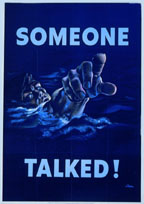An editorial in today’s Washington Post:
THE BUSH administration’s distortion, for political purposes, of the Democratic position on warrantless surveillance is loathsome. Despite the best efforts of Karl Rove, the White House deputy chief of staff, and Ken Mehlman, the Republican National Committee chairman, to make it seem otherwise, Democrats are not opposed to vigorous, effective surveillance that could uncover terrorist activity. Nor are the concerns that they are expressing unique to their party. Republican Sens. John McCain (Ariz.), Arlen Specter (Pa.), Chuck Hagel (Neb.), Lindsey O. Graham (S.C.) and Sam Brownback (Kan.) have expressed legal doubts about the surveillance program. Do they, too, have a “pre-9/11 worldview,” as Mr. Rove said of the Democrats?
Believing there should be constraints on unchecked executive power is not the same as being weak-kneed about the war against terrorism. Critics are suggesting that President Bush should have gone through normal procedures for conducting such surveillance or asked Congress to provide clear legal authority for the National Security Agency activity. They are not contending that such surveillance shouldn’t be conducted at all. No leading Democrat has argued for barring this kind of potentially useful technique.
But you wouldn’t know that to listen to the GOP spin. “Let me be as clear as I can be — President Bush believes if al Qaeda is calling somebody in America, it is in our national security interest to know who they’re calling and why,” Mr. Rove said at the Republican National Committee winter meeting last week. “Some important Democrats clearly disagree.” Mr. Mehlman named names. “Do Nancy Pelosi and Howard Dean really think that when the NSA is listening in on terrorists planning attacks on America, they need to hang up when those terrorists dial their sleeper cells inside the United States?” he asked.
This editorial isn’t as bold as might seem at first glance. I realized it doesn’t blame President Bush himself for any of this fear mongering, even though he’s been playing the same games. On the other hand, for once, WaPo doesn’t claim Dems are just as guilty. It’s a start.
Also in Wapo, Eugene Robinson — who deserves more attention from us liberals, btw — writes,
Once upon a time we had a great wartime president who told Americans they had nothing to fear but fear itself. Now we have George W. Bush, who uses fear as a tool of executive power and as a political weapon against his opponents.
Franklin D. Roosevelt tried his best to allay his nation’s fears in the midst of an epic struggle against fascism. Bush, as he leads the country in a war whose nature he is constantly redefining, keeps fear alive because it has been so useful. His political grand vizier, Karl Rove, was perfectly transparent the other day when he emerged from wherever he’s been hiding the past few months — consulting omens, reading entrails — and gave the Republican National Committee its positioning statement for the fall elections: Vote for us or die.
[Update: Several people have noted that FDR spoke the “nothing we have to fear” line in 1933, about the Great Depression. But FDR spoke about fear and freedom from fear in many other speeches, such as in the “four freedoms” speech from 1941. Since he didn’t use quotation marks I don’t believe Robinson was claiming FDR delivered that exact line about facism, but was just recalling it as a theme FDR used in speeches throughout his presidency.]
Recently a kind person forwarded to me a social psychology paper called “American Roulette: The Effect of Reminders of Death on Support for George W. Bush in the 2004 Presidential Election.” The authors are Florette Cohen and Daniel M. Ogilvie of Rutgers University; Sheldon Solomon of Skidmore College; Jeff Greenberg of the University of Arizona; and Tom Pyszczynski of the University of Colorado at Colorado Springs. This paper is not online, but if you want a copy call Blackwell Publishing at (781) 388-8448.
The authors argue that in the 2004 election, the late October taped appearance of Osama bin Laden had the effect of swinging votes to Bush.
… a week before the election Senator John Kerry was reported to have a slight edge. On Friday, October 29, Osama Bin Laden’s videotaped threat reminded Americans of the death and destruction of 9/11. Americans once again became anxious as the Terror Alert was raised and the Bush administration relentlessly raised the specter of death should John Kerry be elected President. On November 3 Bush was declared the winner of the election by a margin of 3.5 million popular votes. From a terror management perspective, the United States’ electorate was exposed to a wide-ranging multidimensional mortality salience induction. Bush’s rise in popularity after September 11, 2001 and eventual victory in the 2004 presidential election seems highly likely to have been influenced by the appeal of his leadership style (i.e., proclaiming himself divinely ordained to rid the world of evil) to an electorate that was continually reminded of the trauma of the 9/11 terrorist attacks.
(I love the part about how “the United States’ electorate was exposed to a wide-ranging multidimensional mortality salience induction.” There’s something about soc-psych jargon that just makes my heart go pitty-pat.)
The study involves lots of chi-squares and p values, and N = diverse numbers. But to explain very plainly and crudely, Cohen et al. found that test subjects were more likely to support Bush after being reminded they might die in a terrorist attack. The authors also cited other studies that showed people gravitate to charismatic leaders when they are afraid. And they wrote,
Allegiance to charismatic leaders may be one particularly effective mode of terror management. In Escape from Freedom, Eric Fromm (1941) proposed that loyalty to charismatic leaders results from a defensive need to feel a part of a larger whole, and surrendering one’s freedom to a larger-than-life leader can serve as a source of self-worth and meaning in life. Ernest Becker (The Denial of Death, 1973) posited that when mainstream worldviews are not serving people’s need for psychological security, concerns about mortality impel people to devote their psychological resources to following charismatic leaders who bolster their selfworth by making them feel that they are valued participants in a great mission to heroically triumph over evil.
Sound familiar?
This paragraph inspired me to google for Fromm. I dimly remember Fromm from college required reading lists, but I’m sorry to say I don’t retain a lot from those days. I remember going to college, but exactly what I did there is a bit hazy. It’s been a lot of years.
In any event, the googling brought me to this. To condense, Fromm argued that freedom causes anxiety and a sense of aloneness in some people. Coping mechanisms for this condition include automaton conformity, authoritarianism, destructiveness, and individuation. Taking these one at a time —
Automaton conformity: Fearful people can gain a sense of power by acting like everyone else, holding the same beliefs and values, purchasing the same products, and believing in the same morals. They give up much of their individuality, but they feel more secure.
Along these lines, have you ever noticed how righties believe with an absolute, pure faith that their beliefs and values are the beliefs and values of the majority, even when polls say otherwise? I noticed a long time ago that being one of the herd is terribly important to righties. If you argue them into a corner, they nearly always fall back on “most people agree with me, not you looney lefties.”
Authoritarianism contains a paradox — by giving up power to the powerful, the powerless feel more powerful. Put another way, we submit to a leader by submerging our individual identity with the identity of the leader, and thus become powerful like the leader. The more slavishly devoted to the leader we are, the more powerful we think we become. Or at least that’s what it feels like.
Destructiveness refers to destroying people we think keep power away from us. Thus the Right’s obsession with a powerful “liberal elite” that controls society in spite of the fact that it doesn’t exist.
This is the pathology that is contemporary American “conservatism” — great masses of Americans are afraid — of the world, of modernity, of diversity — and to cope with their fears they have submerged themselves in a cult of personality organized around George W. Bush. Righties want to see themselves as part of a powerful army of righteousness that stands united against perceived enemies, such as Islamic terrorists or liberals. And the more fearful they become, the deeper they submerge themselves into the cult. Until, at last, anything approximating “objective reality” is a distant memory.
Oh, that last thing Fromm talked about, individuation, is the ability to be yourself and enjoy true freedom. People at this stage don’t need a personality cult.
Let’s go back to Eugene Robinson. “While Bush gives off none of Rove’s Sith-lord menace,” Robinson writes, “he has made the cultivation of fear a hallmark of his governance.”
You got that right, Eugene. And fear is what rallies the faithful. How else to explain so many people blind to such staggering incompetence?
When the most recent Osama bin Laden tape emerged, I watched some cable TV bobbleheads schmooze about how this would help Bush’s popularity ratings. And why would that be? Why wouldn’t the appearance of the guy Bush vowed to get “dead or alive” more than four years ago remind us of what a flopping incompetent Bush is? Could it be that we are a nation of sheep? Is rallying to Bush some kind of conditioned fear response? Must be, because it sure as hell isn’t rational.
“A great wartime leader rallies his citizens by informing them and inspiring them,” writes Robinson. “He certainly doesn’t use threats to our national security for political gain. He doesn’t just point at a map and say ‘Boo.'”
That’s right. But a great wartime leader ain’t what we got. What we got, is Bush. And what we need, to be freed from his incompetence and his culties, is the mother of all interventions.


 You know a guy is a screwup when incompetence is the least of his problems. It’s not that President Bush is trying to do what’s good for America, and failing; it’s that he doesn’t give a bleep about what’s good for America. Bush’s only concern is Bush. If you want proof, just consider how he plays with national security.
You know a guy is a screwup when incompetence is the least of his problems. It’s not that President Bush is trying to do what’s good for America, and failing; it’s that he doesn’t give a bleep about what’s good for America. Bush’s only concern is Bush. If you want proof, just consider how he plays with national security.